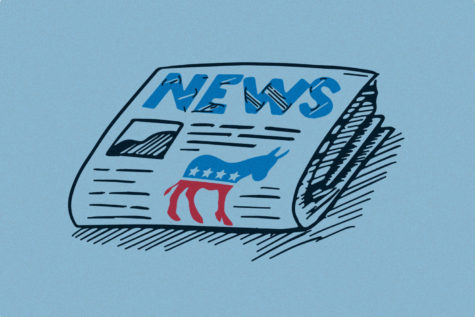OPINION | College students lean liberal

College students have been the face of progressive — and often even radical — political movements in the U.S. and the world for decades.
College campuses in the U.S. were home to many protests of the Vietnam War in the 1960s, most notably at the University of Wisconsin and Kent State University. Thousands of students at Howard University and Columbia University occupied college buildings in 1968 to protest administrative decisions. In 1989, college students in Beijing led a pro-democracy movement in Tiananmen Square. Chinese troops cracked down on the protest, which led to the deaths of hundreds, possibly thousands of students. In the same year in Czechoslovakia, Charles University students organized a demonstration that led to the fall of the communist regime.
This pattern has not shifted in the 21st century. In the 2020 presidential election, 70% of college students voted for Joe Biden in comparison to only 18% for Donald Trump.
However, as the U.S. becomes more divided ideologically, this liberal majority has become a point of contention. Recent headlines show a growing trend of conservative students feeling uncomfortable sharing their political opinions for fear of losing their classmates’ and professors’ respect. Among Republicans, there is increasing distrust in professors and higher education in general.
The association between higher education and leftist viewpoints begs the question: which came first, the chicken or the egg? Do students enter university holding liberal opinions or do their perspectives shift over the course of their education?
For most students, college is an opportunity for them to shape their own opinions, free from familial influences. They are exposed to people with different learned experiences than their own. In the classroom, professors teach theories and concepts that formulate their own thoughts and opinions.
Political ideology plays a larger role in the discussions of students in liberal arts classes than in STEM classes. While in scientific fields, students have the luxury of citing objective facts, the fields of economics and politics leave more room for interpretation. Within liberal arts classes, students require the ability to have a thoughtful debate — and to disagree. Institutions of higher education should be places where people can express their rational ideas, but this has been co-opted by distrust of beliefs that conflict with one’s own.
The polarization of American politics can be partially attributed to the dominance of social issues and ethics in contemporary discussions. Topics regarding discrimination leave little room for compromise — as doing so dismisses a person’s humanity. While they are vital discussions, so are subjects such as foreign relations, transportation and healthcare. These less emotive topics can build the basis for conversation between differing views.
The lack of intellectual, constructive discourse between people with different political ideologies is not unique to college campuses but is merely a reflection of the current American political climate. America has reached a place where people are incapable of listening to someone on the other side of the aisle. Dismissing the expertise of academia is not the solution — but learning how to have constructive conversations is.
Your donation will support the student journalists of Tulane University. Your contribution will allow us to purchase equipment and cover our annual website hosting costs.


